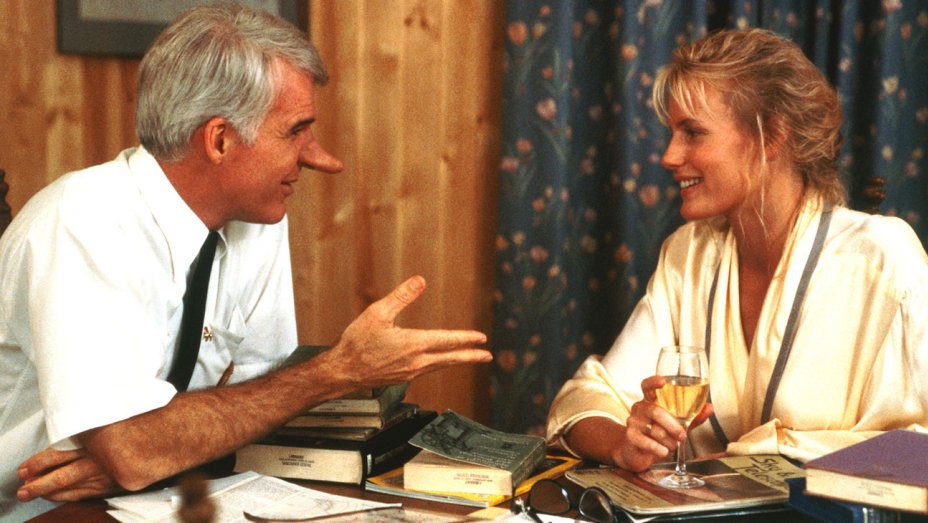Are all movies, essentially, about communication? I remember thinking something similar upon first watching The Fellowship of the Ring. When Gandalf quells Frodo’s insecurity with the supportive phrase, “Even the smallest person can change the course of the future,” it is understandably meant to be a big moment; it’s the theme of the entire trilogy. And yet, isn’t this lesson true of 95% of movies? Isn’t a movie, any movie, a tale of a small person affecting a large (or at least larger) outcome? And, further, aren’t all movies about communication, and the ways we connect with one another, sights unseen, lands unknown? I don’t know, actually, and I don’t have a problem with movies that point it out. Personally, I love knowing that while I will never quite understand what brought an educated voter to cast a ballot for Donald Trump, literally millions of them also share my love of Raiders of the Lost Ark. There, common ground. Start.
The aliens have come to earth in oversized Tic Tacs. These ships not only keep spacebreath fresh for Earth years at a time, they follow their own physical laws, hovering just high enough above the planet that you have to get out the big ladder. No, grampa, the big ladder. And guess what? The interstellar elephant squids inside the darn things don’t speak English. Jerks. How are you supposed to tell ‘em, “get off my lawn?”
Luckily for the North America interlude – there are twelve such ships worldwide – the best linguist round these here parts, Dr. Louise Banks (Amy Adams), is a bit of a basket case, having lost a child to cancer. Normally, that would suck, of course, but it gives her plenty of free time to figure out how to tell E.T. to go home. The aliens open the Tic Tac for visitors once every eighteen hours – hospital rules? Who knows? – and there are a handful of folks invited to the hazmat pajama party, but the only ones who matter are Dr. Banks, mathematician Ian Donnelly (Jeremy Renner), and the military guy in charge of this operation (Forest Whitaker).
At first, everybody wants to play charades with the star-tentacled sneetches, but eventually Dr. Louise gets tired of keeping a symbolic distance, so she sheds her suit, approaches, and offers a hand at the mystical divide [read: big glass plane] separating the species. Her high-five is returned with a high-seven. Ok. Now, we’re getting somewhere. Would it be presumptive to go for a “down low/too slow?” Probably. Maybe we should ask if our visitors have anything to declare. Or just get ‘em to do something. Oh, more ink. Apparently, when they get going, you can’t shut these guys up. Unfortunately, they only seem to communicate in circular Rorschach blots. And connecting with a race of advanced super beings who only communicate in coffee cup stains proves exceedingly difficult; after three full weeks of discussion, the best linguists on the planet had successfully interpreted just three phrases: “decaf,” “latte,” and “this isn’t what I ordered.”
proves exceedingly difficult; after three full weeks of discussion, the best linguists on the planet had successfully interpreted just three phrases: “decaf,” “latte,” and “this isn’t what I ordered.”
Of course, now I think that the aliens knew damn well exactly what Earthlings were saying to them. They just spewed out ink blots because they come from a planet of psychologists. Amy! Listen! Don’t tell them you see evil clowns or death or shit like that! They’ll never leave and they’ll bill us for all the travel.
It is easy to poke fun a sci-fi. Heck, there was an entire cult show in the 90s devoted to the practice. Arrival, however, is far from your average ill-considered alien landing. There is no shortage of trigger-happy folks – just like in real life—who insist upon preemptive eradication. Hence, the two major conflicts in the film are 1) figuring out what our new friends want and 2) doing it before the “Build the Wall”/2nd Amendment people get their way. This strikes me as a much likelier dilemma than the usual alien scenario in which motivation and reaction are evident within five minutes of alien Arrival. And while the action is run by the well-armed, the film is far sharper than a clean delve into the world of “do we attack or don’t we?” I doubt that physics gurus would be happy with the science in the 3rd Act, but don’t let that preclude enjoyment; if you see Arrival, you’re going to talk about it – especially the ending – and for a film about communication, this seems entirely fitting.
♪You’ve been sending in an Earth genius since 11:17
In all the time since landing, I don’t know what she means
That professor at the college who writes stuff with her hand
Look just like blocky squiggles I don’t understand
Are you reelin’ in your fears?
Burying some mines
Are you hoping for hawkish cheers
(While) Forming artillery lines?♫
Rated PG-13, 116 Minutes
D: Denis Villeneuve
W: Eric Heisserer
Genre: “You came to Earth why, exactly?”
Type of person most likely to enjoy this film: Dreamers
Type of person least likely to enjoy this film: Xenophobes
♪ Parody inspired by “Reelin’ in the Years”



